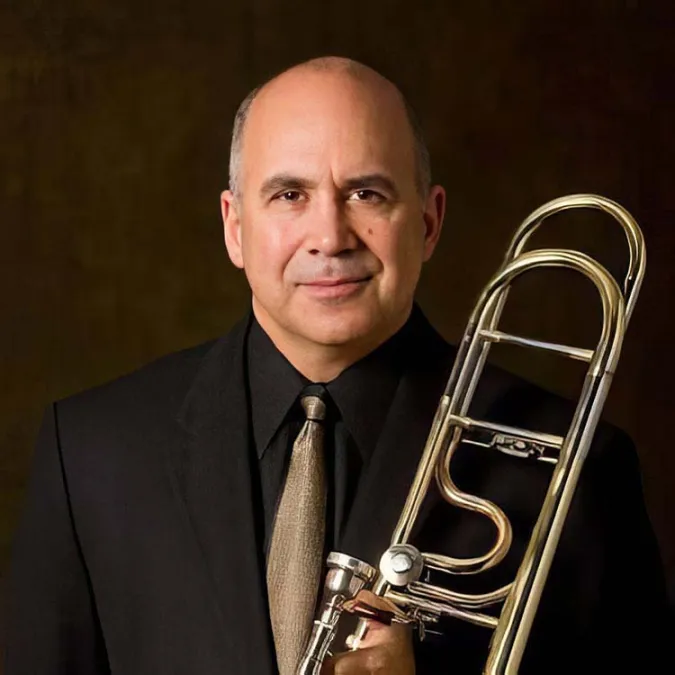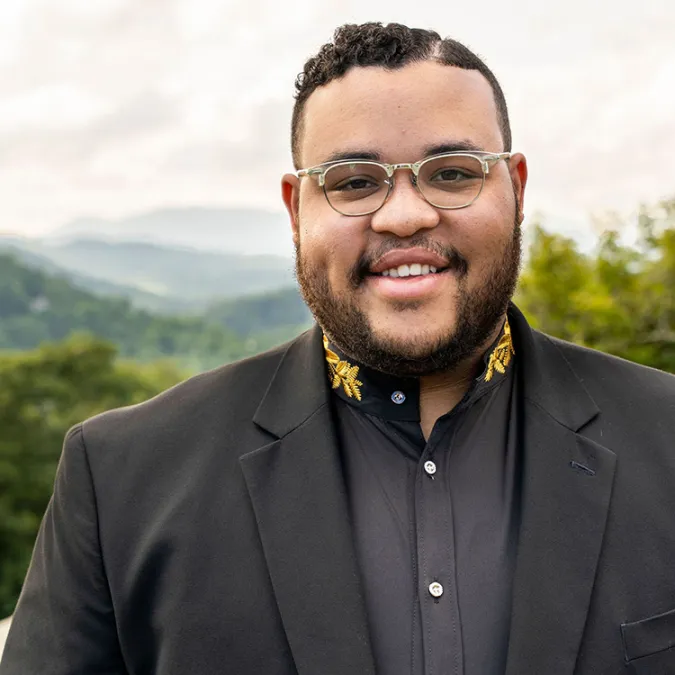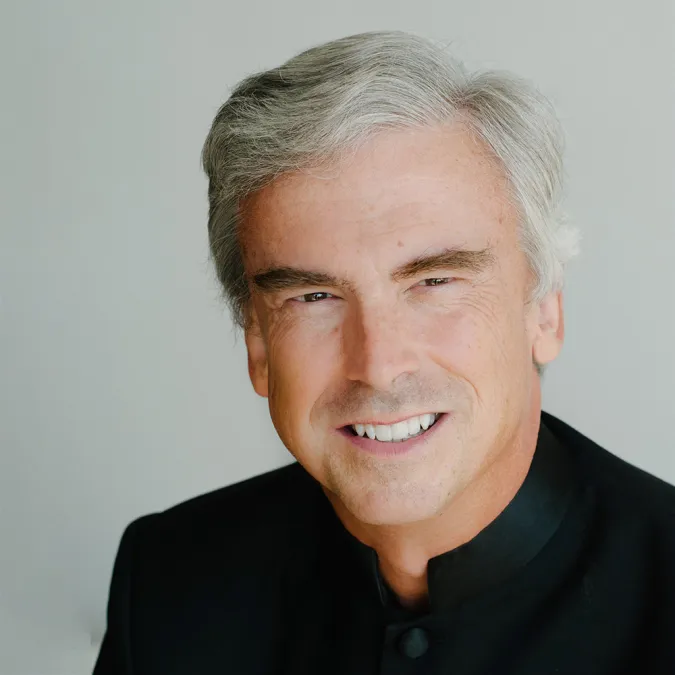
Jerry Junkin, conductor
T.J. Anderson, guest conductor
Joseph Alessi, trombone
John Dickson, piano
This concert will last approximately 65 minutes with intermission.
Program
Ron Nelson
Rocky Point Holiday
T.j. Anderson, guest conductor
Chick Corea
Concerto for Trombone
A Stroll
Waltse for Joe
Hysteria
Joe’s Tango
Joseph Alessi, trombone
John Dickson, piano
Intermission
David Maslanka
Symphony No. 4
About The Program
Ron Nelson
Rocky Point Holiday
BORN December 14, 1929, Joliet, Illinois
COMPOSED 1966
PREMIERE February, 1967, University of Minnesota Concert Band; Frank Bencriscutto, conductor
DURATION 6 minutes
Nelson received his bachelor of music degree in 1952, the master’s degree in 1953, and the doctor of musical arts degree in 1957, all from the Eastman School of Music at the University of Rochester. He studied in France at the Ecole Normale de Musique and at the Paris Conservatory under a Fulbright Grant in 1955. Dr. Nelson joined the Brown University faculty the following year, and taught there until his retirement in 1993. In 1991, Nelson was awarded the Acuff Chair of Excellence in the Creative Arts, the first musician to hold the chair. In 1993, his Passacaglia (Homage on B-A-C-H) made history by winning all three major wind band compositions – the National Association Prize, the American Bandmasters Association Ostwald Prize, and the Sudler International Prize.” About this piece, Nelson told Bencriscutto “I’m going to write a tremendously difficult piece,” When Bencriscutto did not object, Nelson began Rocky Point Holiday. “This was a pivotal moment in my notion of wind ensemble scoring, in which I focused on orchestrating in an extremely transparent way.” Rocky Point was an amusement park in Warwick Neck, Rhode Island that sadly closed down in the mid-1990s due to a lack of funds.
– Penny Brandt
Armando Anthony “Chick” Corea
Trombone Concerto
BORN June 12, 1941
DIED February 9, 2021
COMPOSED 2020
PREMIERED August 5, 2021, São Paulo Symphony Orchestra, Giancarlo Guerrero, conductor, Joseph Alessi trombone
DURATION 24 minutes
Considered one of the most versatile and influential pianists, composers, and bandleaders of our time, Chick Corea’s output and interests spanned from jazz, to free jazz, to fusion, to classical music, and back around again. His twenty-seven Grammy Awards signify his skill and his commercial success, while his collaborations with Miles Davis, Bobby McFerrin, Béla Fleck, the Saint Paul Chamber Orchestra, and the London Philharmonic signify his all-encompassing musicianship and creative prowess. Chick Corea trained at both the Juilliard School and Columbia University, but left before completing degrees at either institution, choosing instead to pursue a touring and recording career that spanned over one hundred albums. His concerto for trombone, subtitled “A Stroll,” was dreamed up by trombonist Joseph Alessi in New York’s famous Birdland Jazz club. Alessi was so taken by a performance of Corea’s “Brasilia” by the jazz pianist Makoto Ozona that he asked Ozona to text Correa his proposition for a trombone concerto, and as the trombonist recounted, “Timing is everything, and it the timing of me asking Chick Corea was the right time for him.” After many texts and a few in-person visits, the concerto was completed in late 2020, and slated for premiere with the São Paulo Symphony Orchestra in the upcoming year. During the pandemic-induced delay in the timeline, Corea died of cancer, leaving this concerto as his last completed work. As he said in one of his many interviews about the work, “I’m putting my love of music together in one package to write this trombone concerto.”
– Mark Bilyeu
David Maslanka
Symphony No. 4
BORN August 30, 1943, New Bedford, MA
DIED August 7, 2017, Missoula, MT
COMPOSED 1994
PREMIERED February 1994, University of Texas at Austin Symphonic Wind Ensemble, Jerry Junkin, conductor
DURATION 27 minutes
From the Composer:
To explain the presence of these hymns, at least in part, and to hint at the life of the symphony, I must say something about my long-time fascination with Abraham Lincoln. Carl Sandburg’s monumental Abraham Lincoln offers a picture of Lincoln in death. Lincoln’s close friend, David Locke, saw him in his coffin. According to Locke, his face had an expression of absolute content, of relief at having thrown off an unimaginable burden. The same expression had crossed Lincoln’s face only a few times in life; when after a great calamity, he had come to a great victory. Sandburg goes on to describe a scene from Lincoln’s journey to final rest at Springfield, Illinois. On April 28, 1865, the coffin lay on a mound of green moss and white flowers in the rotunda of the capitol building in Columbus, Ohio. Thousands of people passed by each hour to view the body. At four in the afternoon, in the red-gold of a prairie sunset, accompanied by the boom of minute guns and a brass band playing Old Hundred, the coffin was removed to the waiting funeral train.
For me, Lincoln’s life and death are as critical today as they were more than a century ago. He remains a model for his age. Lincoln maintained in his person the tremendous struggle of opposites raging in the country in his time. He was inwardly open to the boiling chaos, out of which he forged the framework of a new unifying idea. It wore him down and killed him, as it wore and killed the hundreds of thousands of soldiers in the Civil War, as it has continued to wear and kill by the millions up to the present day. Confirmed in the world by Lincoln, for the unshakable idea of the unity of all the human race, and by extension the unity of all life, and by further extension, the unity of all life with all matter, with all energy and with the silent and seemingly empty and unfathomable mystery of our origins.
Out of chaos and the fierce joining of opposite comes new life and hope. From this impulse I used Old Hundred, known as the Doxology -- a hymn to God; Praise God from Whom all Blessings Flow; Gloria in excelsis Deo -- the mid-sixteenth century setting of Psalm 100.
I have used Christian symbols because they are my cultural heritage, but I have tried to move through them to a depth of universal humanness, to an awareness that is not defined by religious label. My impulse through this music is to speak to the fundamental human issues of transformation and re-birth in this chaotic time.
About the Artists

Joseph Alessi
Joseph Alessi was appointed Principal Trombone of the New York Philharmonic in 1985. Before joining the Philharmonic, he held positions with orchestras in Philadelphia and Montreal. Mr. Alessi is one of the world’s most celebrated soloists, recitalists, and chamber music performers. In 1990, he made his solo debut with the Philharmonic, performing Creston’s Fantasy for Trombone, and in 1992, he premiered Christopher Rouse’s Pulitzer Prize-winning Trombone Concerto. His most recent appearances with the Philharmonic as a soloist were in world-premiere performances of William Bolcom’s Trombone Concerto (2017) and the Chick Corea Trombone Concerto (2021). He has also presented performances worldwide and toured Europe extensively as a master teacher and recitalist. Mr. Alessi has performed as a soloist with several leading concert bands and has recorded with jazz great J.J. Johnson. Mr. Alessi is currently on the faculty of The Juilliard School and is an artist clinician for the Eastman-Shires Instrument Co. You can find further information about Mr. Alessi on his website, slidearea.com.

T.J. Anderson
T.j. Anderson (he/him) is currently pursuing a Doctor of Musical Arts Degree in Wind Conducting as a Graduate Teaching Assistant at the University of Texas at Austin. He earned his Bachelor’s Degree in Music at Coastal Carolina University, focusing on percussion under the mentorship of Dr. Jesse Willis. T.j. continued his education by pursuing a Master’s Degree in Instrumental Conducting at Appalachian State University. There, he studied primarily with Dr. John Stanley Ross. As a graduate teaching assistant, T.j. made contributions to university bands, teaching conducting, band literature, and band methods courses. He also worked with the Marching Mountaineers as a winds and percussion instructor/arranger and served as Musical Director for the Appalachian Concert Band. In addition to his academic pursuits, T.j. has held leadership roles as Artistic Director and Conductor of the Festive Brass and Assistant Conductor of the Carolina Master Chorale. He is an active member of various professional music and education organizations and has been recognized as an Honorary Brother of Kappa Kappa Psi, Phi Mu Alpha Sinfonia, and a Sigma Alpha Iota Friend of the Arts.

Jerry Junkin
Serving since 1988 on the faculty of The University of Texas at Austin, where he holds the Vincent R. and Jane D. DiNino Chair for the Director of Bands, in addition to serving as a University Distinguished Teaching Professor, Jerry Junkin is recognized as one of the world’s most highly regarded wind conductors. Previously, he served on the faculties of both the University of Michigan and the University of South Florida. In addition to his responsibilities as Professor of Music and Conductor of the Texas Wind Ensemble, he serves as Head of the Conducting Division and teaches courses in conducting and wind band literature. He has served as Music Director and Conductor of the Hong Kong Wind Philharmonia since 2003, and as Artistic Director and Conductor of the Dallas Winds since 1993. He also serves as Visiting Professor at the Senzoku Gakuen College of Music Wind Ensemble in Tokyo, Japan. Mr. Junkin has conducted All-State bands and festivals in forty-eight states and five continents, and is a Yamaha Master Educator.
Wind Ensemble
FLUTE
Michael Hung
Rebecca Huynh
Nina Robinson
Katie Worsham
OBOE
Ryan Hirowaka
Rachel Marquez
Nadia Para
CLARINET
Daniel Aisenberg
Jacob Bricker
Chase Cano
Connor Gibson
Hank Landrum
Destiny Lerma
Katelyn Nguyen
Mason Smith
Matthew Rockwell
BASSOON
Corey Castillo
Jonathan Churchett
Katia Osorio
SAXOPHONE
Ethan Ashley
David Bennette
Lucy Croasdale
Jacob Feldman
Ben Kaplan
Marina Sakellakis
HORN
Chia-Ling Chiang
Daniela Garcia
Ethan Gurwitz
Jonah Hammett
Cheryll Huddleston
TRUMPET
Samuel Acosta
Remy Gilboe
Lane Hensley
Tyler Sarver
Emily Tourgeman
TROMBONE
Zach Ailing
Lauren Casey-Clyde
Alvin Ho
Josh Stout
EUPHONIUM
Anthony Gonzalez
Miguel Gonzales
TUBA
Evan Sacks-Wilner
PERCUSSION
Ruben Acuna Gonzalez
Davin Cai
Justin Cooperman
Jaime Garcia
Ethan Hall
Reese Maultsby
Caroline Richards
Sean Simpson
HARP
Natalie Rochen
PIANO
Yixuan Wang
ORGAN
Professor Gregory Eaton
DOUBLE BASS
Reilly Curren
UPCOMING EVENTS
Butler Opera Center Presents
THE QUEEN OF SPADES
April 19 & 26, 7:30 pm | April 21 & 28, 4:00pm
McCullough Theatre
SYMPHONY BAND
Wednesday, April 21, 7:30 pm
Bates Recital Hall
WIND SYMPHONY
Friday, April 26, 7:30 pm
Bates Recital Hall
SYMPHONY ORCHESTRA
Concerto Competition Winners 1
Saturday, April 27, 7:30 pm
Bates Recital Hall
SYMPHONY ORCHESTRA
Concerto Competition Winners 2
Monday, April 29, 7:30 pm
Bates Recital Hall
Event Details
All University of Texas at Austin students are allowed one free ticket as long as they are available. Student tickets must be picked up at the Box Office with valid student I.D. Seating is unassigned.
If you are a patron with ADA needs, please email tickets@mail.music.utexas.edu and we will reserve ADA seating for you.

